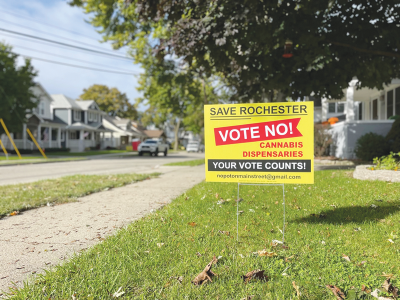ROCHESTER — Voters recently rejected two petition-initiated ballot proposals that would have allowed recreational marijuana sales in the city of Rochester, prompting the City Council to consider a potential action plan in case a similar petition is made in the future.
When marijuana was first legalized in Michigan, Rochester was one of many cities to adopt an ordinance opting out of allowing businesses to sell marijuana within the city.
“In November of 2018, City Council passed an ordinance that completely prohibited any marijuana businesses in the city of Rochester, period — and the Michigan Regulation and Taxation on Marihuana Act gave the city the ability to do that,” Rochester City Attorney Jeffrey Kragt said.
However, in 2023, a group outside the city — called the Open Stores in Rochester Committee and based in Ingham County — collected hundreds of signatures to initiate two ballot measures pushing for the sale of cannabis in the city.
On Nov. 7, 2023, Rochester voters rejected the two ballot proposals, with 89% against allowing three stores selling recreational marijuana within the city, and 87% against allowing a licensing and application process that would have allowed three retailers of recreational marijuana.
Following the election, the City Council directed the city attorney to look into different options regarding marijuana businesses in the hopes of potentially avoiding future citizen-initiated legislation on it.
“This was just to talk about the process, so we don’t get caught up again,” Mayor Stuart Bikson said of the discussion. “We want to know everything we didn’t know before. I think the people on this council were some of the most ardent ‘no-marijuana on Main Street’ people in the entire city, but we felt like it was our duty to do due diligence, just to see what the processes are and we can do better to not have to go through that situation again, if possible.”
Kragt said the city basically has three options.
One, do nothing and let the current prohibition of marijuana businesses within the city stand.
Two, enact legislation allowing marijuana retailers within certain areas of the city, implementing more controls — including the location, zoning, number of establishments permitted, selection processes, signage, rules and regulations, and more.
Or three, propose a city-crafted ordinance and/or charter amendment to be placed on the ballot for an upcoming election for people to vote on whether they want marijuana establishments in the city, rather than voting on regulations proposed by an outside entity.
Regardless of the option, Kragt told council members there is no way of preventing future groups from petitioning to place marijuana-related amendments on the ballot of upcoming elections.
“If you do nothing, someone can come in and say, ‘We want to put this on the ballot,’ just like this last one. If you adopt an ordinance, that doesn’t preclude someone from coming in and putting something on the ballot. If you put something on the ballot, it’s only good until the next ballot, so what I can’t do is to tell you that whatever option you select, no one can come through and undo or put something different in place,” he said.
Ultimately, the council decided to do nothing.
“No matter what we do, they can come back and put it back on the ballot,” Councilwoman Debbie Jones said. “I feel like the community spoke at a very high level, and I think that it might even get confusing (if) we put it on the ballot.”
Councilwoman Marilyn Trent agreed.
“Now we know: There’s no way to get ahead of it … and if there’s no way to get ahead of it, I agree with Council member Jones. This is a dead issue.”
Mayor Pro Tem Nancy Salvia said the residents of Rochester “spoke very loudly,” despite the fact that Michigan’s legal marijuana retailers sold more than $3 billion worth of cannabis in 2023.
“I think council has taken the best prohibitive action we can take by prohibiting retail in our city limits, but I also know that they can come back again, so we just have to continue to educate residents that it may come back in their court again, to say no again. From the council’s standpoint, I think our position is clear, where we’re at right now with our ordinances,” she said.
“To me, the big number right now is 89% and 87%, and I’m willing to let that ride out there as our message, until otherwise noted,” Bikson added.
Kragt said he would keep the council updated if any new options arise in the future.
“I’m your advocate. I will bring it back to you,” said Kragt.
 Publication select ▼
Publication select ▼
























